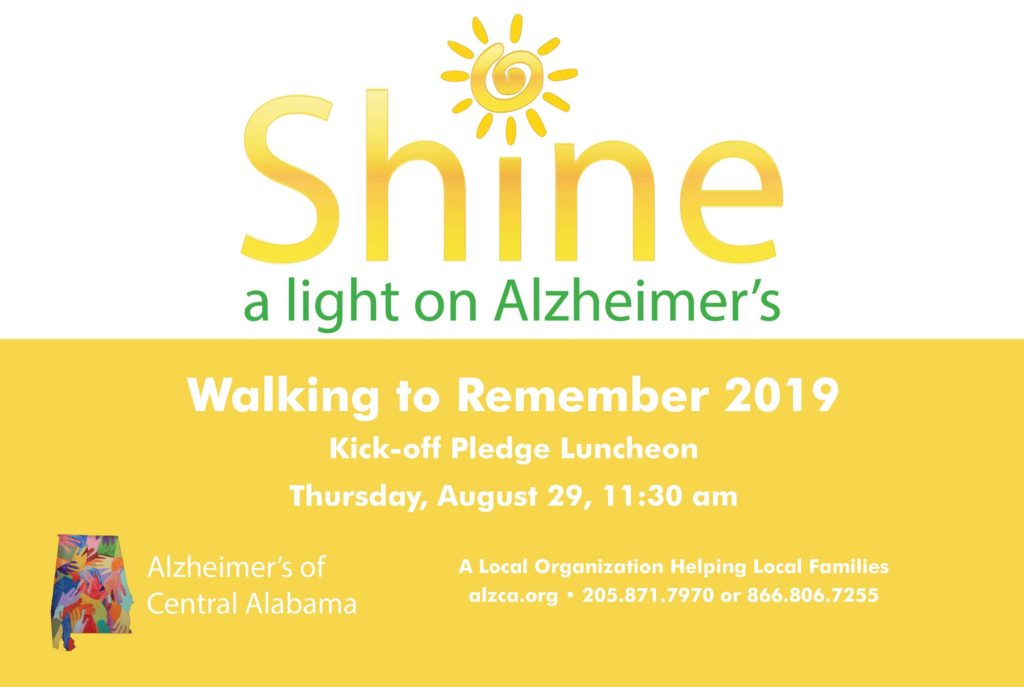Walk to Remember, benefitting Caring Days Adult Day Care Center, August 17, 10 – 11:30, inside University Mall, Tuscaloosa. 205-752-6840 or www.caringdays.org.
Elder Care Conference, Saturday, August 17, 8 – noon, First Baptist Church, Trussville. Panel includes experts legal issues and community resources. There is no charge to attend. See attached flyer.
New Alzheimer’s & dementia support group, Tuesday, August 20, 5:30 – 6:30, Lakeview Estates, 2634 Valleydale Road. 205-981-0001.
Meet Patti Callahan Henry, bestselling author of The Favorite Daughter, on Tuesday, August 27th at 5:30 pm at Saint Luke’s Episcopal Church. Her story explores the power of memory and the meaning of family in the face of dementia. Proceeds benefit Founders Place, a memory loss respite ministry at St. Luke’s. Tickets are $35 and include a wine and cheese reception & signed copy of The Favorite Daughter. Favorite Daughter event poster www.FoundersPlacePresents.eventbrite.com
17th Annual Caddell Alzheimer’s Conference, Tuesday, August 27, Epic Church, Decatur. Excellent line up of speakers. 256-353-1160 or www.mhainmc.net. Benefits MHA Alzheimer’s program. See attached flyer.
Shine a Light on Alzheimer’s Kick Off Luncheon for Alzheimer’s of Central Alabama’s Walk to Remember,Thursday, August 29, 11:30, at Danberry. Join us to learn more about the services and programs provided by ACA. Sign up to be a team captain and gather your friends and family to Walk with you Saturday, November 2, inside the Riverchase Galleria.
Alzheimer’s in Alabama: Alzheimer’s of Central Alabama’s annual conference, Friday, October 18, Canterbury United Methodist Church. Our special guest will be Jamie Tyrone, who is in a rare group of only 2% of the population who carry 2 copies of the ApoE4 gene, which means she has a 91% chance of developing Alzheimer’s. Click to learn more about her new book, “Fighting For My Life” Mark your calendar and make plans to join us. Details to follow.
News to know:
A former recipient of an Alzheimer’s of Central Alabama research grant has been in the news. In 2006, ACA funded Ozioma Okonkwo’s study, “Impaired Awareness of Functional Deficits in Mild Cognitive Impairment”. For nearly a decade, Ozioma, Assistant Professor of Medicine at the University of Wisconsin School of Medicine and Public Health, has studied a unique group of middle-aged people at higher risk of developing Alzheimer’s. An August 9, 2019 Time article describes his findings that focus on the positive impacts of exercise on cognition, finding those who exercise didn’t decline at the same rate as those who are inactive.
An August 12, 2019 Newsweek article spotlighted a new study, from the University of California, San Francisco, about the link between daytime sleepiness and Alzheimer’s disease, which is connected to the build-up of tau protein.
According to an August 11, 2019 New Atlas article, a new study on the connection between depression and Alzheimer’s disease, led by Harvard Medical School researchers, found that mild depression is one of the first clinical signs of AD. Depression symptoms themselves may be among the early changes in the preclinical stages of dementia syndromes and represent a clinical window of opportunity for closely monitoring at-risk individuals, and for potentially introducing interventions to prevent or slow cognitive decline.
Learn more about the link between football, dementia, and Chronic Traumatic Encephalopathy (CTE). A new study from Boston University’s Chronic Traumatic Encephalopathy (CTE) Center is one of the first to reveal the biological mechanisms that link years of playing football to white matter injury.
The Alabama Legislature passed bills during the 2019 Regular Session that move Alzheimer’s Disease and dementia under the Alabama Department of Public Health, and Governor Kay Ivey signed this legislation into law. When Congress declared Alzheimer’s Disease a public health crisis and passed the Building Our Largest Dementia Infrastructure Act (the BOLD Act) in December 2018, it created an Alzheimer’s public health infrastructure across the country. This legislation was needed so that Alabama is eligible to receive federal dollars under the BOLD Act and so that UAB is eligible to be designated a Center of Excellence in Alzheimer’s and dementia research and care by the Centers for Disease Control and Prevention (the CDC). www.andalusiastarnews.com/2019/08/14/ivey-signs-bill-to-properly-fund-alzheimers-education/
Congress is in recess, but now is a good time to reach out to your legislators about 2 critical advocacy issues. UsAgainstAlzheimer’s has provided the attached sheet that provides more information:
- The 2019 CHANGE Act (H.R. 2283 / S. 1126) is bipartisan legislation that encourages early detection, diagnosis, and access to interventions. It will incentivize and equip providers with the tools they need to accurately detect and diagnose Alzheimer’s at its earliest stages by directing the Centers for Medicare and Medicaid Services (CMS) to require the use of cognitive impairment detection tools supported by the NIH.
- Federal Appropriations for Alzheimer’s Funding at the NIH Alzheimer’s advocates have pushed Congress to increase funding for Alzheimer’s research from $450 million in 2010 to $2.3 billion in 2019 – a 400% increase. Advocates are calling for a $350 million increase in FY 2020, while the current budget provides a modest $60 million increase. If funding remains at current proposed levels, critical new research will be underfunded.
Find your Congressmen here: https://www.house.gov/representatives/find-your-representative
Find your Senators here: https://www.senate.gov/general/contact_information/senators_cfm.cfm
Want a sharp mind, strong memory? Ramp up activities. Read Andrew Budson’s Harvard Health blog. https://www.health.harvard.edu/blog/want-a-sharp-mind-strong-memory-ramp-up-activities-2019080817480 …
Falls and Home Safety in Alzheimer’s Disease free webinar, September 12. Sponsored by the Alzheimer’s Foundation of America. To learn more and to register, click here


You must be logged in to post a comment.